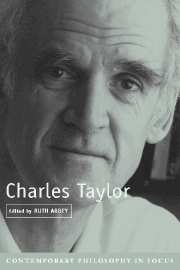Book contents
- Frontmatter
- Contents
- List of Contributors
- Acknowledgments
- Introduction: Timely Meditations in an Untimely Mode - The Thought of Charles Taylor
- 1 Taylor and the Hermeneutic Tradition
- 2 Taylor's (Anti-) Epistemology
- 3 The Self and the Good: Charles Taylor's Moral Ontology
- 4 Articulating the Horizons of Liberalism: Taylor's Political Philosophy
- 5 Toleration, Proselytizing, and the Politics of Recognition: The Self Contested
- 6 Taylor and Feminism: From Recognition of Identity to a Politics of the Good
- 7 Catholicism and Philosophy: A Nontheistic Appreciation
- 8 Taylor, “History”, and the History of Philosophy
- Bibliography
- Index
3 - The Self and the Good: Charles Taylor's Moral Ontology
Published online by Cambridge University Press: 05 June 2012
- Frontmatter
- Contents
- List of Contributors
- Acknowledgments
- Introduction: Timely Meditations in an Untimely Mode - The Thought of Charles Taylor
- 1 Taylor and the Hermeneutic Tradition
- 2 Taylor's (Anti-) Epistemology
- 3 The Self and the Good: Charles Taylor's Moral Ontology
- 4 Articulating the Horizons of Liberalism: Taylor's Political Philosophy
- 5 Toleration, Proselytizing, and the Politics of Recognition: The Self Contested
- 6 Taylor and Feminism: From Recognition of Identity to a Politics of the Good
- 7 Catholicism and Philosophy: A Nontheistic Appreciation
- 8 Taylor, “History”, and the History of Philosophy
- Bibliography
- Index
Summary
Since the early work of Elizabeth Anscombe, Philippa Foot, and Iris Murdoch in Oxford in the 1950s, moral philosophers in the analytic tradition have discussed the viability of reconstructing something like ancient Greek ethics (Plato for Murdoch, Aristotle for the other two) in order to avoid versions of Kantian deontology or of utilitarianism, which then seemed the only choice on the agenda. Now that the latter predominates, the challenge, as Charles Taylor puts it, is to get beyond treating “all goods which are not anchored in human powers or fulfilments as illusions from a bygone age.” That is to say, he wants to open up a nonanthropocentric perspective on the good, to allow us to see the “sovereignty of good” over the moral agent. Sources of the Self, Taylor's major contribution to moral philosophy, is explicitly a “retrieval” of this nonanthropocentric perspective which, as he believes, philosophy since the Enlightenment has been motivated to occlude.
From the beginning of his philosophical career, Taylor has sought to relieve us of philosophical theorising that seems misguided or blinkered. He detected behaviourism at work in influential psychological theories (section 1). He sees modern moral philosophy concerned only with doing right at the expense of considering what the good for human beings actually is (sections 2 and 3). He contends that the ancient belief in the objectivity of the good is still at work in everyday moral behaviour, however confusing and undermining modern philosophical theories are of this idea (sections 4 and 5).
- Type
- Chapter
- Information
- Charles Taylor , pp. 84 - 104Publisher: Cambridge University PressPrint publication year: 2004
- 8
- Cited by



